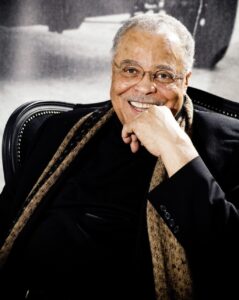
James Earl Jones was born on January 17, 1931, in a tiny place called Arkabutla, Mississippi. You’ve probably never heard of it, and if you have, you might be wondering how it’s still clinging to the map. Nestled among the heat and the humidity, the town isn’t much more than a whisper in the wind, but that’s where his story begins. It’s where one of the most iconic voices in the world was first introduced.
Early Life
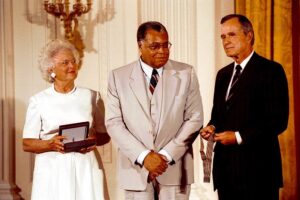
Now, let’s get this out of the way early: James Earl Jones, the voice of Darth Vader, the man who made the line “This is CNN” sound like it was delivered by an oracle on the mountaintop, the force behind Mufasa’s regal wisdom didn’t always have the booming, confident voice that would later reverberate through the airwaves and movie theaters. Oh no, far from it. In fact, young James Earl Jones couldn’t even talk for a long stretch of his childhood. He was mute for years, struck silent by a stutter that would have kept most of us from opening our mouths to order fast food, let alone pursue a career in acting and voiceover work.
Imagine, if you will, a young boy, tucked away on a farm in Michigan after moving north with his grandparents, not saying a word. The wide-open spaces around him, the sprawling fields, the towering trees were all filled with sounds he couldn’t join. It’s almost poetic, isn’t it? The kid who would go on to become one of the greatest voices of all time, trapped inside himself, unable to form the words that would later come so naturally.
Overcoming his Stutter
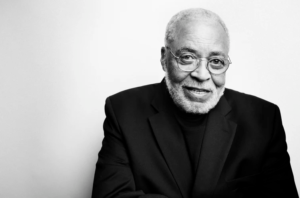
The stutter didn’t just go away on its own. Jones had to work at it, painstakingly untangling the knots in his speech with the help of a high school teacher who recognized something special in him. This teacher encouraged young James to read poetry aloud to practice speaking. That’s when things started to click. Slowly, carefully, he found his rhythm and his cadence. The words began to flow more smoothly. The once-silent boy discovered that he had a voice, and not just any voice. It was a voice that could move mountains.
By the time he finished high school, James Earl Jones had not only found his voice, but he had also discovered a love for the arts, which was a bit of a surprise to his farming family. Acting wasn’t exactly on the list of sensible career paths, but there was something about stepping into different characters and using language to express feelings and ideas that struck a chord with him.
College and the Military
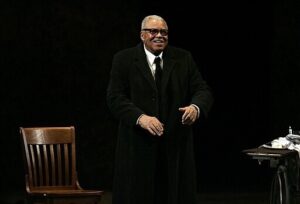
In 1949, he enrolled at the University of Michigan, not initially to study acting, but to pursue medicine. It didn’t take long for him to realize that being a doctor wasn’t in the cards for him. After all, a life in a lab or clinic was not going to satisfy that creative itch he had discovered. So, in a move that was probably met with more than a few raised eyebrows, Jones pivoted toward the stage.
After college, Jones took his talents to New York City, that great proving ground for actors with dreams bigger than their apartments. It wasn’t exactly a meteoric rise to fame—he spent years working odd jobs and honing his craft in off-Broadway productions. During this time, he also served in the U.S. Army during the Korean War, although he didn’t see combat. He spent most of his service as a Ranger in Colorado.
Early Career
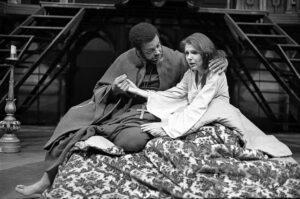
By the 1960s, James Earl Jones was beginning to make a name for himself on the stage, earning critical acclaim for his roles in Shakespearean plays. There’s something almost surreal about the idea of Jones, this son of the Deep South and a man who had been silenced by a stutter, standing on stage and performing Othello or King Lear with all the eloquence and precision of the Bard himself. But that’s exactly what happened. His performances were magnetic, drawing attention from the theater world and beyond.
Theater might have been his first love, but the big screen wasn’t far behind. Jones made his film debut in 1964 with Dr. Strangelove, but his real breakout role came in 1970 with The Great White Hope, where he played boxer Jack Johnson. It was a role that earned him an Academy Award nomination and solidified him as a force to be reckoned with in Hollywood.
Star Wars and other Iconic Roles
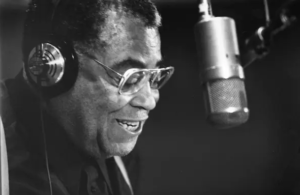
And then, of course, came 1977, the year that the universe (quite literally, in this case) would never be the same. That was the year when James Earl Jones became the voice of Darth Vader in Star Wars. Think about that for a second. Star Wars, the space opera that would go on to become a cultural phenomenon, would have been unthinkably different without Jones’s deep, resonant voice giving weight to every line that came out of Vader’s mouth, and he would reprise the character many times throughout his long and storied career.
The role of Darth Vader wasn’t the only iconic character Jones would voice. In 1994, he lent his voice to Mufasa in Disney’s The Lion King, becoming the embodiment of paternal wisdom and strength. Mufasa’s voice is the kind of voice you want to hear when the chips are down, when you’re questioning everything, when you need someone to remind you of who you are. And who better to deliver that message than Jones, whose voice had become synonymous with authority and reassurance?
Jones’s voice work has overshadowed much of his live-action performances, but it would be a mistake to overlook the breadth of his on-screen career. He appeared in films like Conan the Barbarian, Coming to America, and Field of Dreams, each time bringing a quiet intensity to his roles. He wasn’t flashy or over-the-top; instead, he let his presence do the talking. It’s as if he didn’t need to shout to be heard. People just naturally listened.
Television and Awards
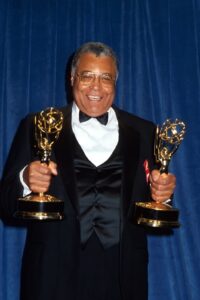
In the 1980s and 1990s, Jones became a fixture on television as well. Whether narrating the introduction for CNN, appearing on stage, or popping up in guest roles on sitcoms, his versatility as an actor was on full display. In many ways, he became an institution, the kind of performer who seemed to exist outside of time and always relevant.
Throughout his career, Jones earned a heap of awards and accolades: an honorary Oscar, a Tony Award, an Emmy, and a Grammy, making him one of the few performers to achieve EGOT status. However, these trophies, as impressive as they are, don’t really tell the full story of his impact.
What made James Earl Jones stand out wasn’t just his ability to command a stage or lend gravitas to a role. It’s the way he overcame what could have been an insurmountable obstacle. For a man who was once afraid to speak, who battled a speech impediment so severe it kept him silent for years, to become a legendary orator, that’s the real story here. It’s a tale of perseverance, of finding your voice when it seems like the world is determined to keep you quiet.
Legacy
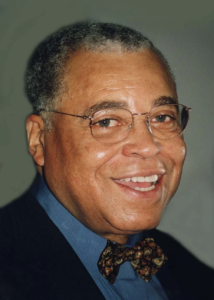
Now, that he’s passed, James Earl Jones has made his last contribution to the world. The voice of Darth Vader has been officially retired, and though we won’t be hearing him in new roles, his legacy will continue to echo. Younger generations still hear his voice when they watch The Lion King or Star Wars for the first time. They may not know his name right away, but they recognize the weight of that voice, the way it seems to come from deep within the earth itself.
James Earl Jones is a reminder that sometimes the things that hold us back can become the very things that set us apart. That a stutter, a silence, can be transformed into a roar. And what a roar it was. It’s the voice of kings, of villains, of fathers and, for anyone lucky enough to hear it, it’s the voice of inspiration.
In the end, what James Earl Jones leaves behind is more than just an iconic voice. He leaves behind a story of quiet determination, of resilience, of a man who didn’t just find his voice, he made sure the world heard it.
James Earl Jones, January 17, 1931 – September 9, 2024